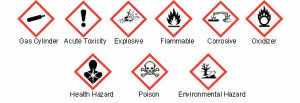Author's posts
Apr 08
Regulatory Requirements for Emergency Generators
In recent years, commercial new construction and building retro-fit projects that include the installation of emergency generators have increased as the real-time operations of companies become more and more dependent upon digital data and communications. In most states, and particularly in the Mid-Atlantic region, all but very small generators must be permitted and/or registered – …
Permanent link to this article: https://www.ces-ehs.com/clients
Mar 27
The Lab Standard and Chemical Hygiene Plan
In the 1980s, OSHA recognized that the standards used for industrial worker exposure to hazardous chemicals were inappropriate for laboratory settings. Therefore a standard was developed and promulgated on May 1, 1990. Its full title is: 1910.1450 Occupational Exposure to Hazardous Chemicals in Laboratories. It is commonly referred to as “The Lab Standard.” The first …
Permanent link to this article: https://www.ces-ehs.com/clients
Feb 15
Breathe Easy
Over five million American workers wear respirators in the workplace and are covered by OSHA’s Respiratory Protection standard (29CFR 1910.134). Effective respiratory protection saves hundreds of lives and prevents thousands of illnesses each year. About half the states have OSHA-approved state plans that must be identical to, or at least as effective as the federal …
Permanent link to this article: https://www.ces-ehs.com/clients
Jan 05
Moving From the MSDS to GHS
Nearly everyone is aware of the material safety data sheet (MSDS) that must be prepared by a chemical manufacturer and maintained at a workplace by a user of the chemical or chemical mixture. However, probably few have heard of the globally harmonized system of classification and labeling of chemicals (GHS). This is a method of …
Permanent link to this article: https://www.ces-ehs.com/clients
Dec 10
From Party Balloons to Pharmaceutical Research
Millions of compressed gas cylinders are used worldwide every day with complete safety. When a compressed gas cylinder accident does occur however, it can be deadly. These accidents are usually the result of the following: Damage to the cylinder or valve; Improper regulating equipment; Incompatible materials. Damage to Cylinder or Valve We know that all …
Permanent link to this article: https://www.ces-ehs.com/clients
Nov 17
The Eyes (Should) Have It
Safety eyewear, that is! These simple and inexpensive devices are the most widely mandated item of personal protective equipment (PPE) in the laboratory and workplace. Yet, we frequently see safety eyewear not being used at all! Eye protection is available in a wide variety of styles and protection levels, from safety glasses to full face …
Permanent link to this article: https://www.ces-ehs.com/clients
Oct 20
Down the Drain
The Infamous Floor Drain In decades past, most laboratories were built with floor drains. They were designed to catch spills or water from safety shower use. They did their job very well! If you want to demonstrate the use of a mercury vapor analyzer, just go to an old lab’s floor drain and you will …
Permanent link to this article: https://www.ces-ehs.com/clients
Sep 28
Take Care of the Lifeguard!
Fume hoods may seem like “nice-to-have” accessories in the laboratory. Often cluttered and dirty, they don’t get the respect due a critical safety feature – and sometimes, a life saver! In a well-designed laboratory, fume hoods are a critical part of the air handling system. Lab Air Supply By drawing out stale lab air, fume …
Permanent link to this article: https://www.ces-ehs.com/clients
Jun 20
Emergency Planning and Community Right-to-Know Act (EPCRA)
Overview The Emergency Planning and Community Right-to-Know Act, also known as Title III of the Superfund Amendments and Reauthorization Act, was enacted at the national level in 1986. It established requirements regarding emergency planning procedures and “Community Right-to-Know” reporting on hazardous and toxic chemicals in the workplace. Reporting – The Toxic Release Inventory (TRI) Under …
Permanent link to this article: https://www.ces-ehs.com/clients
May 20
Do You Need a Permit For That Emergency Generator?
The installation of most permanent generators requires an air permit, which should be obtained before the installation of the generator. Additional permits may also be required, pertaining to safety and noise pollution. For a generator to qualify as an emergency generator, it must only be run when there is a failure of the main power …
Permanent link to this article: https://www.ces-ehs.com/clients

